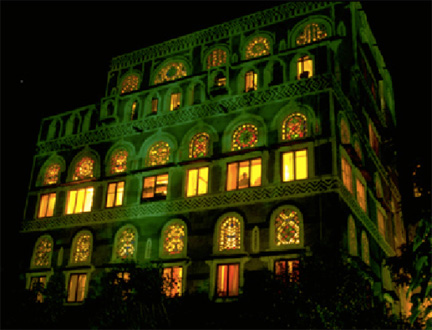
Bayt al-Hilali. Lighted middle floor was Wyatt’s home in Sanaa,Yemen (1970-72); Photo by Peggy Crawford (1988)
Is Yemen Really a Hotbed of Terrorism? “No,†says Author.
Arabian Nights and Daze Evokes a Friendlier Yemen than the Media Presents
Americans today have a negative image of Yemen and its people in the aftermath of media focus on radical Islam and terrorist activities in that country. Susan Clough Wyatt’s Arabian Nights and Daze: Living in Yemen with the Foreign Service provides timely insights into this vulnerable country, its history and culture, and the enormous challenges Yemen faces today. Arabian Nights and Daze has been selected as part of the Memoirs and Occasional Papers Series of the Association for Diplomatic Studies and Training (ADST) in Arlington, Virginia.
Journey back to 1970 when Wyatt and her Foreign Service officer husband reopened the U.S. diplomatic mission to the Yemen Arab Republic (YAR) after its closure at the time of the 1967 Arab-Israeli War. Arriving only eight years after progressive revolutionaries ousted a thousand-year-old dynasty of conservative Shiite Muslim imams, they found the mission in a shambles. Under the protection of the Italian embassy, they built it back in stages prior to full resumption of diplomatic relations with the YAR in 1972. Wyatt’s husband, David McClintock, served as principal officer and she the mission’s secretary. Her role as spouse was critical to the success of a mission viewed as the highest level of hardship post by State Department standards at that time.
Wyatt describes with both humor and respect the country’s struggles in the early throes of becoming a modern, viable state in this remote corner of Arabia. The Yemeni people in the 1970s were friendly, respectful, and hospitable; they were not terrorists, as Western media claimed after the 2000 USS Cole attack in Aden’s harbor. Today, they are still a friendly, resilient, and proud people who are pawns in an international game of politics.
Arabian Nights and Daze concludes with two chapters that discuss major challenges facing the present Yemen government. These include:
•terrorist acts inside its borders led by outside insurgents,
• the global economic crisis,
• a major Shiite rebellion in the north near the Saudi border,
•a strong secessionist movement in the south,
•depleted natural resources, including oil and much-needed water,
•a government having little control in remote areas,
•high population growth, high unemployment, 50% illiteracy, and widespread poverty.
A chronology of Yemen’s long history, a glossary of terms, and a comprehensive bibliography provide the reader additional resources for developing a better understanding and more positive regard for a little-known country maligned by negative media.
Contact Wyatt by email for information about discount pricing, events/presentations, and book signings. Copies of Arabian Nights and Daze can also be obtained from ADST (www.adst.org) or from New Academia Publishing (www.newacademia.com) for the retail price of $26 plus shipping.